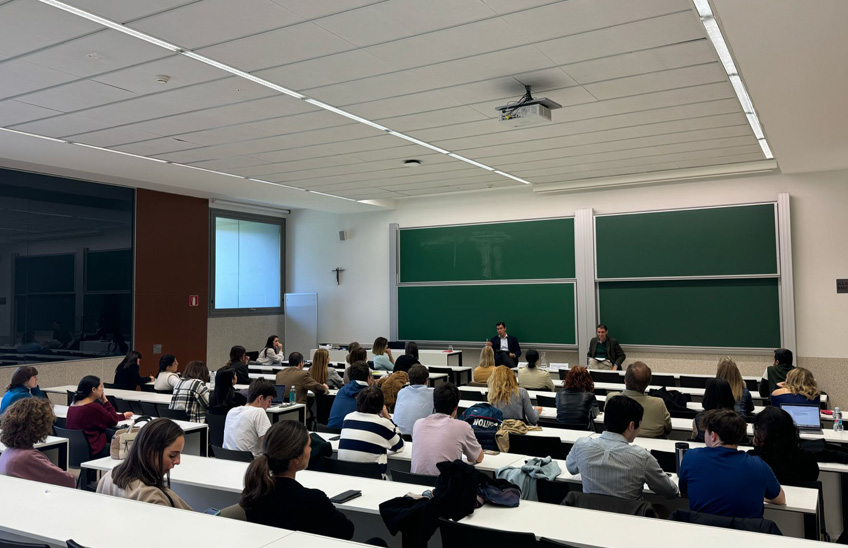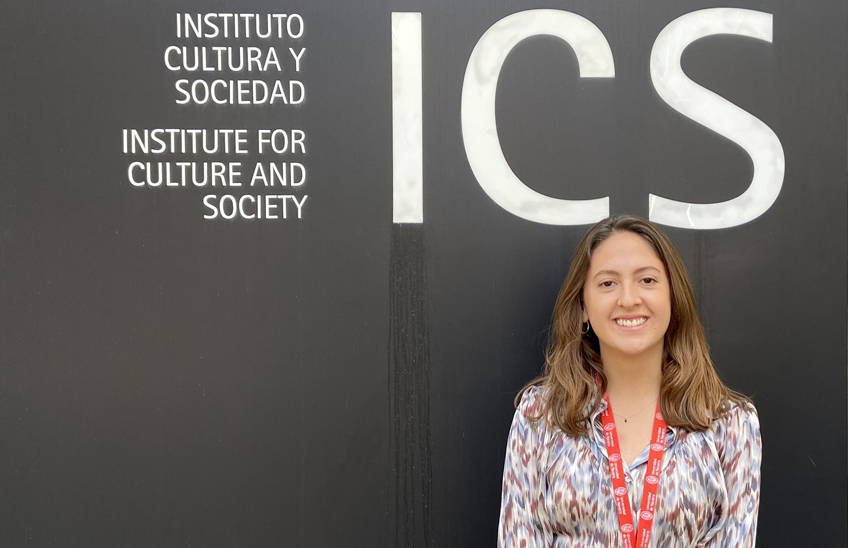"We must make ourselves trustworthy, people who know what they are talking about, who do things right and who make others aware in the relationship."
More than 40 students and mentors reflect on the polarization of society in the framework the Re-connect cycle, organized by Compass, the Counseling and Wellness Unit.

PhotoCedit/
21 | 02 | 2025
Compassthe University's Counseling and Welfare Unit, in partnership with the Core Curriculum Institute, has held the third session of Re-conecta, a cycle of 4 sessions aimed at students and mentors. Last Wednesday, February 19, Azucena Díez presented the third session "Is it possible to live in a polarized world?", which was developed with a colloquium between Jordi Rodríguez Virgili and Francisco Javier Pérez Latre, both professors at the School of Communication.
The session began by situating the concept of polarization and why it is important to talk about it now. Polarization is not new, and has been on the rise in the last century. As Professor Rodríguez Virgili commented, there are three types of polarization: ideological, affective and social or everyday. The first, which refers to difference and separation, is not bad in itself, he pointed out; however, affective polarization, which translates into the affinity or rejection that something produces in us, is negative, "because it leads to emotional separation and makes it difficult to reach agreements". As he explained, social polarization refers to the social, demographic and geographic differences established according to who you vote for.
As an example, he shared some data, among others, that in Spain, 79% of the population is not willing to share a neighborhood with people who think completely different from them; or that 80% would prefer not to share work spaces. The percentage drops slightly when it comes to helping those who think completely differently, to 73%, he explained.
The dichotomous political discourses, the media that only seek an audience, the technological disruption that accelerates our time and fragments public opinion, and the human condition that leads us to create stronger bonds with people who are similar to us, are all causes of polarization, as the expert stated. Looking at the status we could ask ourselves, what can we do?
"We can start with the difference between tolerance and respect," the teachers pointed out. It is necessary to be intolerant, because this is a reference letter to ideas, but above all, it is necessary to be respectful, because respect is addressed directly to people, they stressed. When polarization becomes part of everyday life, it becomes a "mega-identity" that defines our behavior and thoughts, which is a problem.
In this way we dehumanize the other, as Professor Pérez Latre commented, we stop seeing them as people and, in some way, we simplify and categorize them according to ideas. When these concepts are confused, we start to put people from the sack of the neighborhood, unique individual beings, to the sack of the mass, anonymous people characterized by ideas.
It is necessary to depoliticize the way we look at things, as well as to have a presumption of rationality and sincerity, breaking with previous prejudices. It is also necessary to change the logic with which we relate to each other, to move from a constant to win and impose, to share and integrate, trying to understand and make ourselves understood. It is also useful to broaden social relations, to stop talking about what separates us and find what unites us. This can even reach friendship, since it is to understand and to love.
Sharing spaces is not easy, looking for common spaces where this friendship can take place is complex. Since its beginnings, our university has sought to create this space for our students. St. Josemaría, the founder of this university, used to say: "The university is a common home, a place of study and friendship.
How do I deal with this concept of polarization, then? For this we need to educate ourselves, to know what the ideas are about and what we are talking about. In addition, we must make ourselves trustworthy, we only trust people of integrity, competent and benevolent, i.e. people who know what they are talking about, who do things right and who make us aware in the relationship. This building of trust directly implies improving our listening skills.
It does not consist in reaching the minimum common ground in order to be in agreement with the other, but in allowing the truth to prevail with peace and respect, they concluded.




